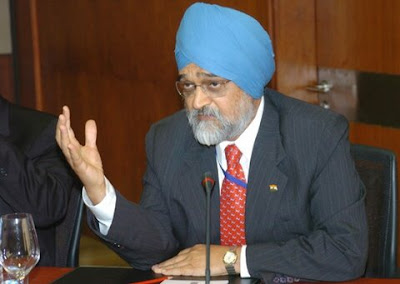NDTV seems to have taken a firm place in our home in Finland.
Today I watched the Budget Battleground Part 2 from St. Andrew,s College, Mumbai. (I reported on the panelists in Part 1 in my earlier blog entry.)
One of the reasons I watched was that 54er/58er Rahul Bajaj, 54er from Cathedral School and 58er from St. Stephen's College, Chairman of Bajaj Enterprises and an Independent Rajya Sabha member was among the panelists. In 2009, when Annikki and I visited Delhi, Rahul stayed back one weekend evening so he could meet up with us in a party organized for us by Cathedralites led by 64er Deepak Deshpande.
I was under the impression that Adi Godrej was a Cathedralite, like his nephew 65er Jamshyd Godrej, who passed through Finland last year with his wife 65er Pheroza. Although I could not meet up with Jamshyd, I had a long chat with Pheroza, also a Cathedrtalite.
Adi Godrej was, however, from St. Xavier's School and College in Bombay.
There was another member of the alumni on the panel that was from my alma mater. It was 73er Vikram Singh Mehta, the Chairman of Shell, about 10 years my junior, but known for his bringing the Royal Shell Oil group back to India. I have not had the pleasure or benefit of meeting Vikram. He came into prominence well after I left India in 1984. Being from the same professional area, I did watch his career rise with interest.
The fourth panelist was one who I have not met but am associated with indirectly as he is the brother-in-law of one of my dearest friends, the late 59er Ashok Kapur, former Chairman of YES Bank. Rana Kapur is now in the top spot of the bank. I do not know him personally, so am unable to comment on his stature.
The discussion was not very memorable in that nothing new was really thrown up. The focus was on the disinvestment of the Government of India from Public Sector companies as well as privatization.
Certainly, as leaders in the Private Sector, as family run companies in the case of Adi and Rahul, and as a leader of a MNC as Royal Dutch Shell, in the case of Vikram, and as the head of an outstanding private bank set up by Ashok in his heyday, the general opinion was that the Government should stick to Governing while industrialists and professional managers should stick to running businesses professionally.
It was one question from the students that really summed up the situation. Is the outsourcing boom was not far away. I am glad that a young student could recognize this as it will not be long before we see this side of the contribution to Indian growth completely dry up as localities as Vietnam, start to cut into our traditional business strongholds.
You can watch this episode in the NDTV archives. Hope this link works:
http://www.ndtv.com/video/player/ndtv-special-ndtv-24x7/budget-battleground-what-india-expects-from-pranab-babu/226057
Enjoy.










